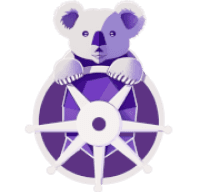Kubernetes
Why Kubernetes is a Game-Changer
Feb 5, 2024
Why Kubernetes is a Game-Changer
Kubernetes, an open-source container orchestration platform, is dominating the containerization landscape. According to a 2023 CNCF survey, over 96% of organizations are using or evaluating Kubernetes in their production environments. This widespread adoption reflects Kubernetes' ability to meet the needs of modern DevOps practices. Additionally, Kubernetes is now deployed in over 85% of cloud-native applications, making it a cornerstone of cloud and hybrid cloud strategies.
Why Choose Kubernetes Over Other Alternatives?
While there are several container orchestration platforms available, such as Docker Swarm, Apache Mesos, and Amazon ECS, Kubernetes stands out as the most robust and versatile solution. Unlike other alternatives, Kubernetes offers a comprehensive and flexible ecosystem that can be tailored to a wide range of use cases, from small-scale deployments to managing complex, multi-cloud environments. Its open-source nature ensures that you are not locked into a single vendor, providing the freedom to run your applications on any infrastructure. Moreover, Kubernetes' vast community and ecosystem mean continuous innovation, a wealth of resources, and seamless integration with the latest DevOps tools and practices. This makes Kubernetes not just a tool, but a strategic investment that future-proofs your DevOps operations, giving you a competitive edge in today's rapidly evolving technology landscape.
If you’re building backend services today, large or small, you should definitely be leveraging k8s.
Here is why K8s became the go-to solution for most companies:
1. Seamless Container Orchestration:
Containers have reshaped software deployment, but orchestrating them at scale poses challenges. Kubernetes steps in as an orchestrator, ensuring that containers are launched, monitored, and scaled according to specified configurations. With Kubernetes, DevOps teams are freed from the complexities of container management.
2. Improved Scalability and Efficiency:
Modern applications need to scale according to demand. Kubernetes provides auto-scaling features, where the number of containers can increase or decrease automatically based on metrics like CPU usage. This dynamism ensures resource efficiency and enables applications to handle traffic spikes without human intervention.
3. Enhanced Portability:
With Kubernetes, there's less worry about being locked into a specific cloud provider. As an open-source platform, Kubernetes ensures application portability across various cloud providers or even on-premise environments. For DevOps, this means flexibility and the freedom to choose the best environment without constraints.
4. Built-in Fault Tolerance:
No system is immune to failures. Kubernetes inherently supports redundancy, ensuring that if a container or even an entire node fails, another takes its place. This built-in fault tolerance keeps applications running smoothly, minimizing downtime and manual effort for disaster recovery.
5. Efficient Resource Management:
Kubernetes intelligently allocates resources to containers based on their usage and requirements. By ensuring optimal resource utilization, it not only conserves infrastructural resources but also reduces costs, benefiting both development and operations.
6. Ecosystem and Community Support:
Kubernetes is not just a tool; it's a thriving ecosystem. The vast community behind Kubernetes continually pushes updates, patches, and plugins. DevOps teams can benefit from this wealth of resources and collective knowledge, ensuring they're always at the forefront of container orchestration best practices.
7. Automation and Orchestration:
Kubernetes automates the deployment, scaling, and management of containerized applications, significantly reducing the manual effort involved in DevOps processes. This automation frees up DevOps teams to focus on higher-value tasks, such as developing new features and improving application performance.
8. Improved Observability and Monitoring:
Kubernetes provides comprehensive monitoring and observability capabilities, giving DevOps teams deep insights into application performance and resource utilization. This visibility enables teams to proactively identify and address potential issues before they impact users.
9. Fostering Innovation and Agility:
Kubernetes empowers organizations to innovate and adapt quickly to changing market demands. Its flexibility and scalability enable rapid experimentation and deployment of new features, allowing organizations to stay ahead of the competition.
10. Fostering a DevOps Culture:
Kubernetes adoption encourages a DevOps culture within organizations, promoting collaboration, automation, and continuous improvement. It breaks down silos between development and operations teams, fostering a shared responsibility for application delivery and performance.
11. Continuous Delivery and Deployment:
Kubernetes streamlines continuous delivery and deployment (CD) processes, enabling rapid and reliable deployment of new application versions. It integrates seamlessly with CI/CD tools, automating the deployment of code changes and ensuring that applications are always up-to-date.
The Complexity and Challenges of Kubernetes
Kubernetes, while powerful, comes with its own set of challenges. Managing it without a supporting solution like KoalaOps can be daunting, with its steep learning curve and potential for misconfigurations. Running Kubernetes independently requires significant resources and ongoing maintenance, and as the ecosystem evolves rapidly, staying up-to-date adds to the operational burden. Yet, despite these challenges, most companies today choose Kubernetes as their preferred solution due to its significant benefits for teams of all sizes.
That’s where KoalaOps steps in. It allows you to harness the power of Kubernetes while abstracting its complexities with a PaaS-like interface. By automating leading tools in the ecosystem, KoalaOps lets you run Kubernetes seamlessly in your cloud environment—without needing your developers to be Kubernetes experts.









